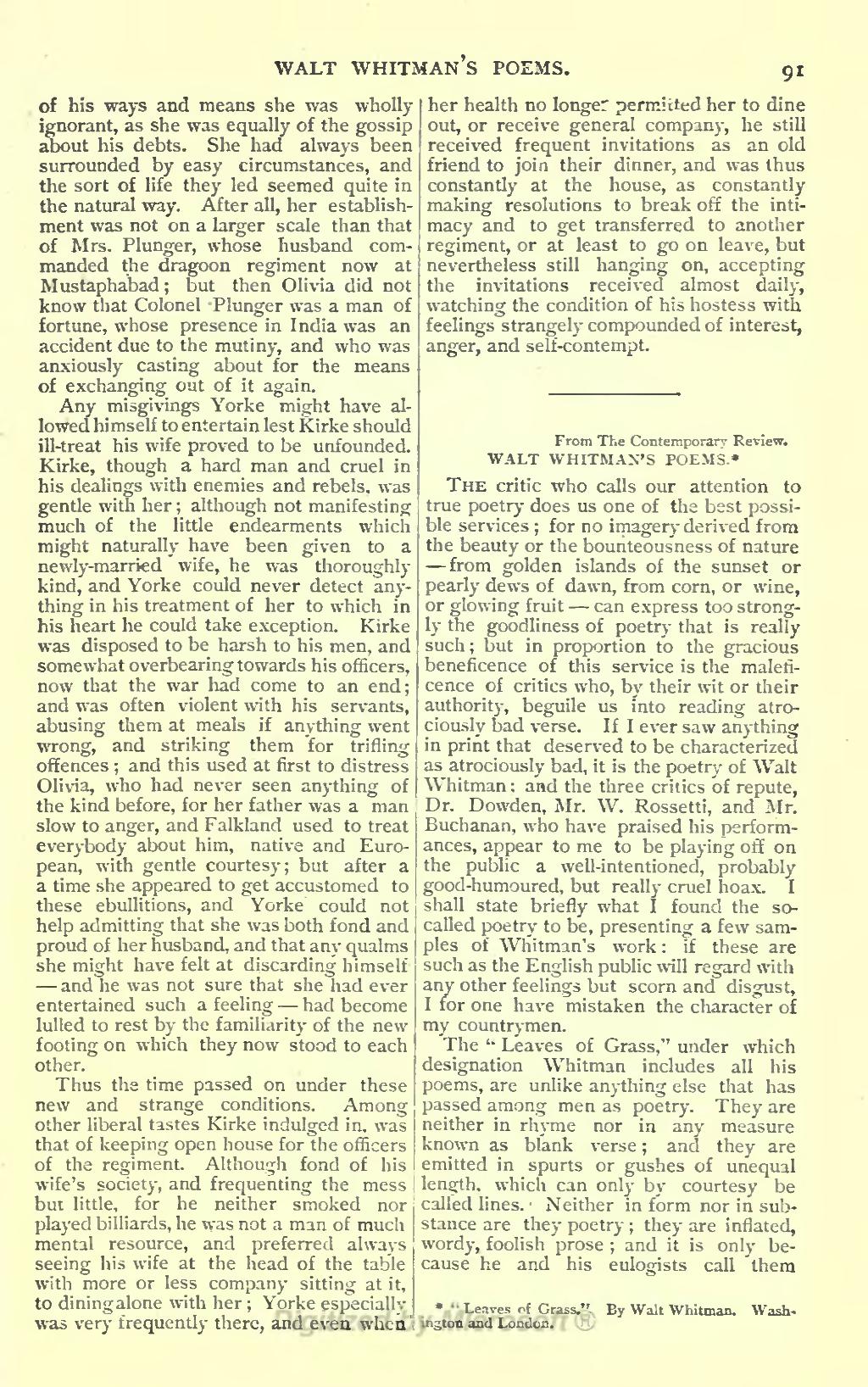of his ways and means she was wholly ignorant, as she was equally of the gossip about his debts. She had always been surrounded by easy circumstances, and the sort of life they led seemed quite in the natural way. After all, her establishment was not on a larger scale than that of Mrs. Plunger, whose husband commanded the dragoon regiment now at Mustaphabad; but then Olivia did not know that Colonel Plunger was a man of fortune, whose presence in India was an accident due to the mutiny, and who was anxiously casting about for the means of exchanging out of it again.
Any misgivings Yorke might have allowed himself to entertain lest Kirke should ill-treat his wife proved to be unfounded. Kirke, though a hard man and cruel in his dealings with enemies and rebels, was gentle with her; although not manifesting much of the little endearments which might naturally have been given to a newly-married wife, he was thoroughly kind, and Yorke could never detect anything in his treatment of her to which in his heart he could take exception. Kirke was disposed to be harsh to his men, and somewhat overbearing towards his officers, now that the war had come to an end; and was often violent with his servants, abusing them at meals if anything went wrong, and striking them for trifling offences; and this used at first to distress Olivia, who had never seen anything of the kind before, for her father was a man slow to anger, and Falkland used to treat everybody about him, native and European, with gentle courtesy; but after a a time she appeared to get accustomed to these ebullitions, and Yorke could not help admitting that she was both fond and proud of her husband, and that any qualms she might have felt at discarding himself — and he was not sure that she had ever entertained such a feeling — had become lulled to rest by the familiarity of the new footing on which they now stood to each other.
Thus the time passed on under these new and strange conditions. Among other liberal tastes Kirke indulged in, was that of keeping open house for the officers of the regiment. Although fond of his wife's society, and frequenting the mess but little, for he neither smoked nor played billiards, he was not a man of much mental resource, and preferred always seeing his wife at the head of the table with more or less company sitting at it, to dining alone with her; Yorke especially was very frequently there, and even when her health no longer permitted her to dine out, or receive general company, he still received frequent invitations as an old friend to join their dinner, and was thus constantly at the house, as constantly making resolutions to break off the intimacy and to get transferred to another regiment, or at least to go on leave, but nevertheless still hanging on, accepting the invitations received almost daily, watching the condition of his hostess with feelings strangely compounded of interest, anger, and self-contempt.
WALT WHITMAN'S POEMS.[1]
The critic who calls our attention to true poetry does us one of the best possible services; for no imagery derived from the beauty or the bounteousness of nature — from golden islands of the sunset or pearly dews of dawn, from corn, or wine, or glowing fruit — can express too strongly the goodliness of poetry that is really such; but in proportion to the gracious beneficence of this service is the maleficence of critics who, by their wit or their authority, beguile us into reading atrociously bad verse. If I ever saw anything in print that deserved to be characterized as atrociously bad, it is the poetry of Walt Whitman; and the three critics of repute, Dr. Dowden, Mr. W. Rossetti, and Mr. Buchanan, who have praised his performances, appear to me to be playing off on the public a well-intentioned, probably good-humoured, but really cruel hoax. I shall state briefly what I found the so-called poetry to be, presenting a few samples of Whitman's work: if these are such as the English public will regard with any other feelings but scorn and disgust, I for one have mistaken the character of my countrymen.
The "Leaves of Grass," under which designation Whitman includes all his poems, are unlike anything else that has passed among men as poetry. They are neither in rhyme nor in any measure known as blank verse; and they are emitted in spurts or gushes of unequal length, which can only by courtesy be called lines. Neither in form nor in substance are they poetry; they are inflated, wordy, foolish prose; and it is only because he and his eulogists call them
- ↑ "Leaves of Grass." By Walt Whitman. Washington and London.
